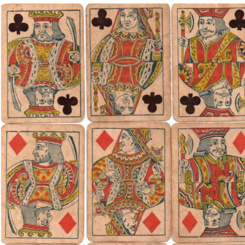42: Andrew Dougherty
Andrew Dougherty was one of the biggest American card-makers in the 19th century
Andrew Dougherty was one of the biggest American card-makers in the 19th century, if not the biggest. After a relatively early start in a small way in 1848, at which time he produced packs of rather poor quality in terms of the cardboard he used, but which had very unusual courts, he invented and developed new methods of production and his business expanded hugely, so that in the 1870s he was producing three and a half million packs a year. Since there is a detailed description of his firm in Tom and Judy Dawson's Hochman's Encyclopedia (pp.67-80), I will not attempt to reproduce it all here. Instead I would like to give examples of the way his standard courts developed. Given his output during the last third of the 19th century, it's hardly surprising that so many of his packs have survived.
For a full list of my Dougherty cards click here►
After Thomas Crehore's factory burned down in 1846, finishing his business, aces of spades with the name spelt without a final e (Crehor) were used by at least two makers: Samuel Hart and Andrew Dougherty. There are a number of Crehor packs that can be attributed to Dougherty. One of them is found with either a Crehor AS or a Dougherty one. Here the traditional postures are hardly discernible: lots of profile courts and even a full-faced QH.
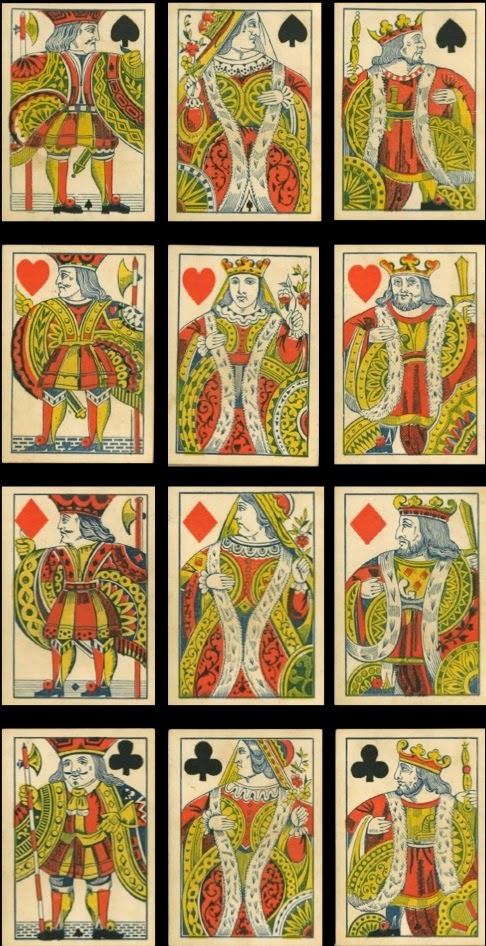
Above: Crehor/Dougherty, c.1850
There is another version in which the kings and jacks are the same and the queens have taken on their traditional postures.

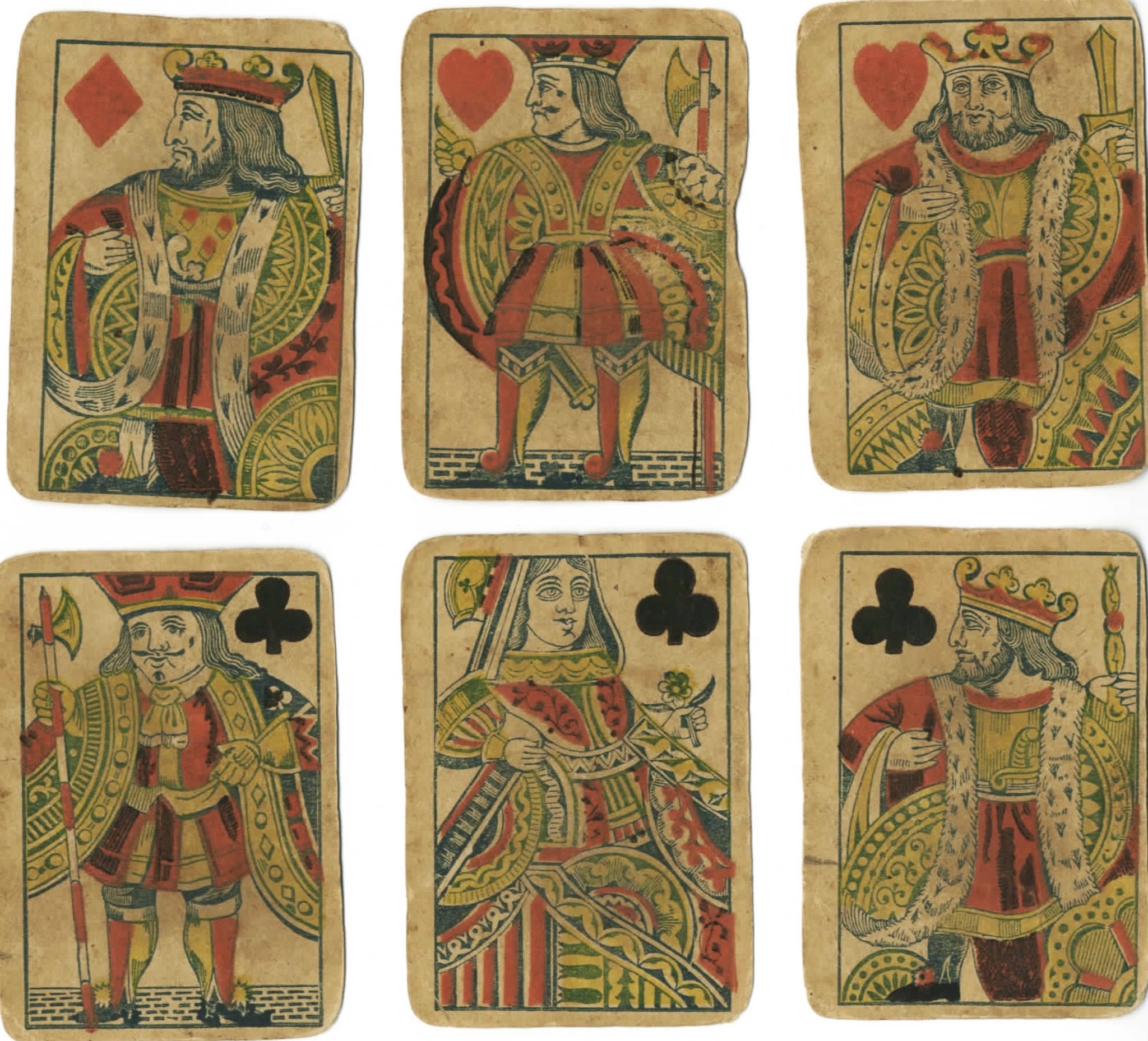
Above: Crehor/Dougherty, c.1850
And there is even a double-ended version in which some of the courts are based on those above, whereas others have been redesigned and look more traditional.
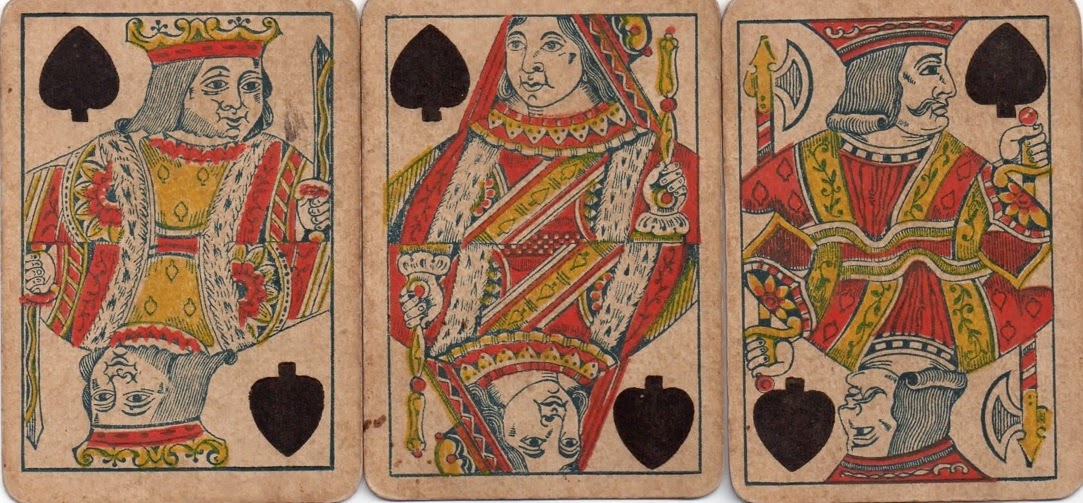
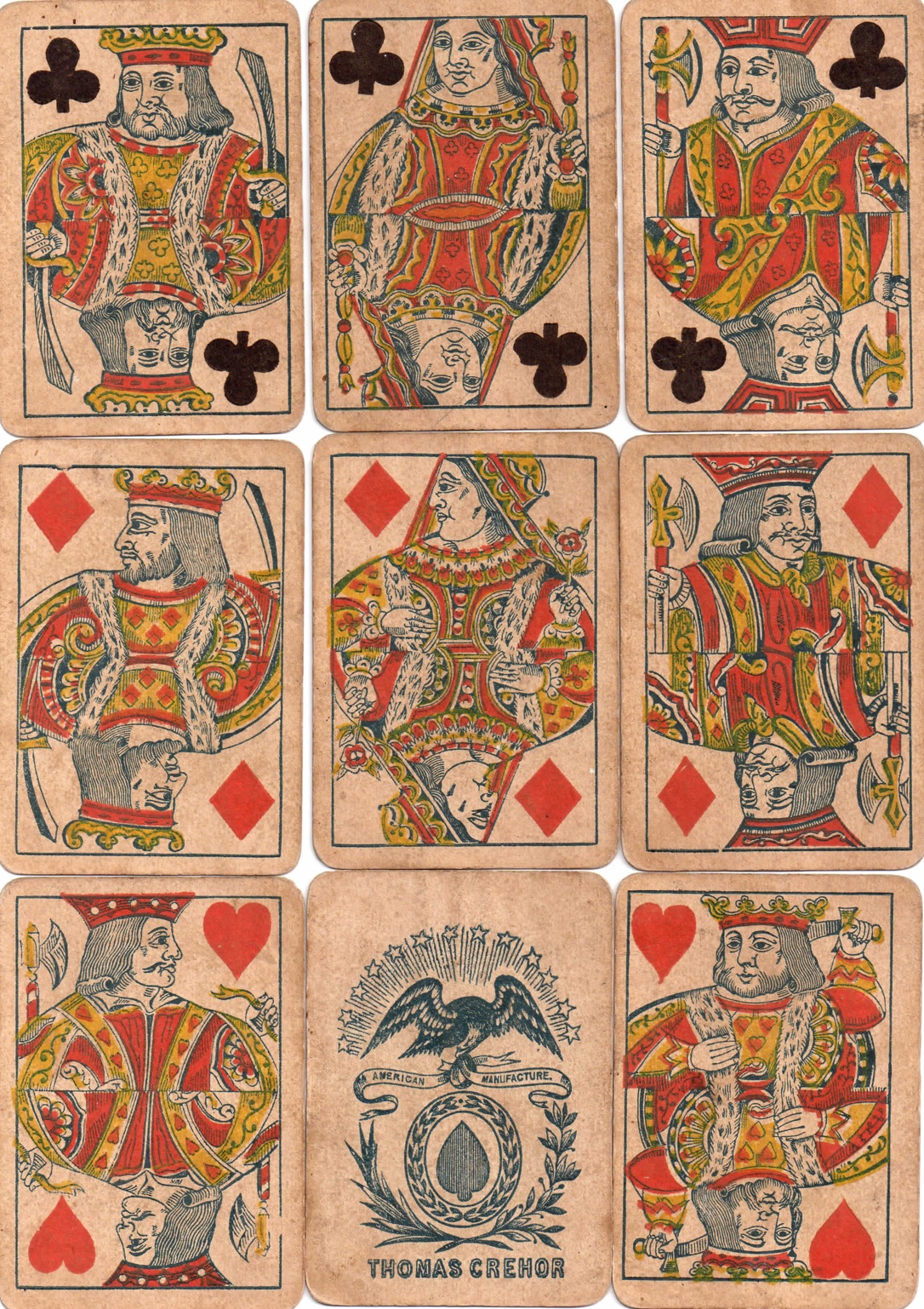
Above: Crehor/Dougherty, c.1850
Slightly later possibly, there is a different set of courts, which by now all have traditional postures, and which is also found with a Crehor or a Dougherty AS.
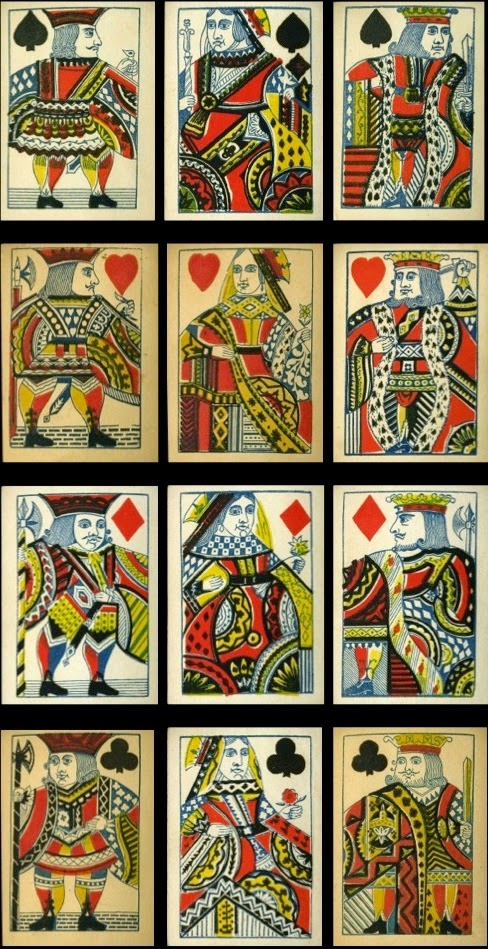
Above: Above: Crehor/Dougherty, c.1855
Some time after this he is using a variety of traditional designs, one of which comes from during his short partnership with the Coughtry brothers. It is an early version of US8, a design used later by Lawrence & Cohen.
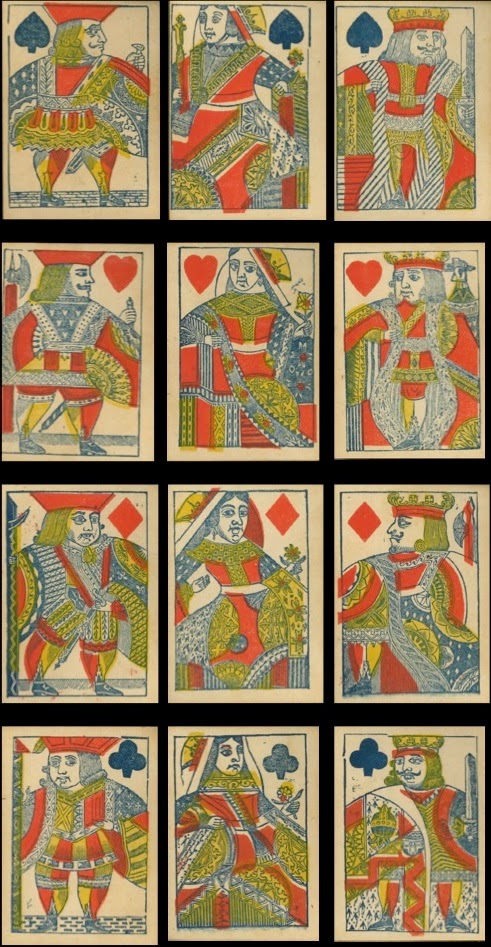
Above: Above: Coughtry & Dougherty, c.1852
In the 1850s he also introduced packs with the old-fashioned design used in Faro packs, harking back to the wood-block and stencil era, though his were printed in letterpress. These courts were used for many years.

Above: c.1855-80
He finally settled on De La Rue's design (D3, single-ended, and D4/D4.1, double-ended) as the basis of his later packs. His copy of D3 is very close to the original and he used it in his illuminated pack of c.1865. (By this time De La Rue were producing very few single-ended packs.). Even the back design is a copy of Owen Jones's popular Cotton Plant (see page 59) made into a double-ended design with added wheat heads.

Above: Illuminated pack, USD3, c.1865
The double-ended packs were fairly crude copies of D4/D4.1 and may have been used in cheaper packs only.
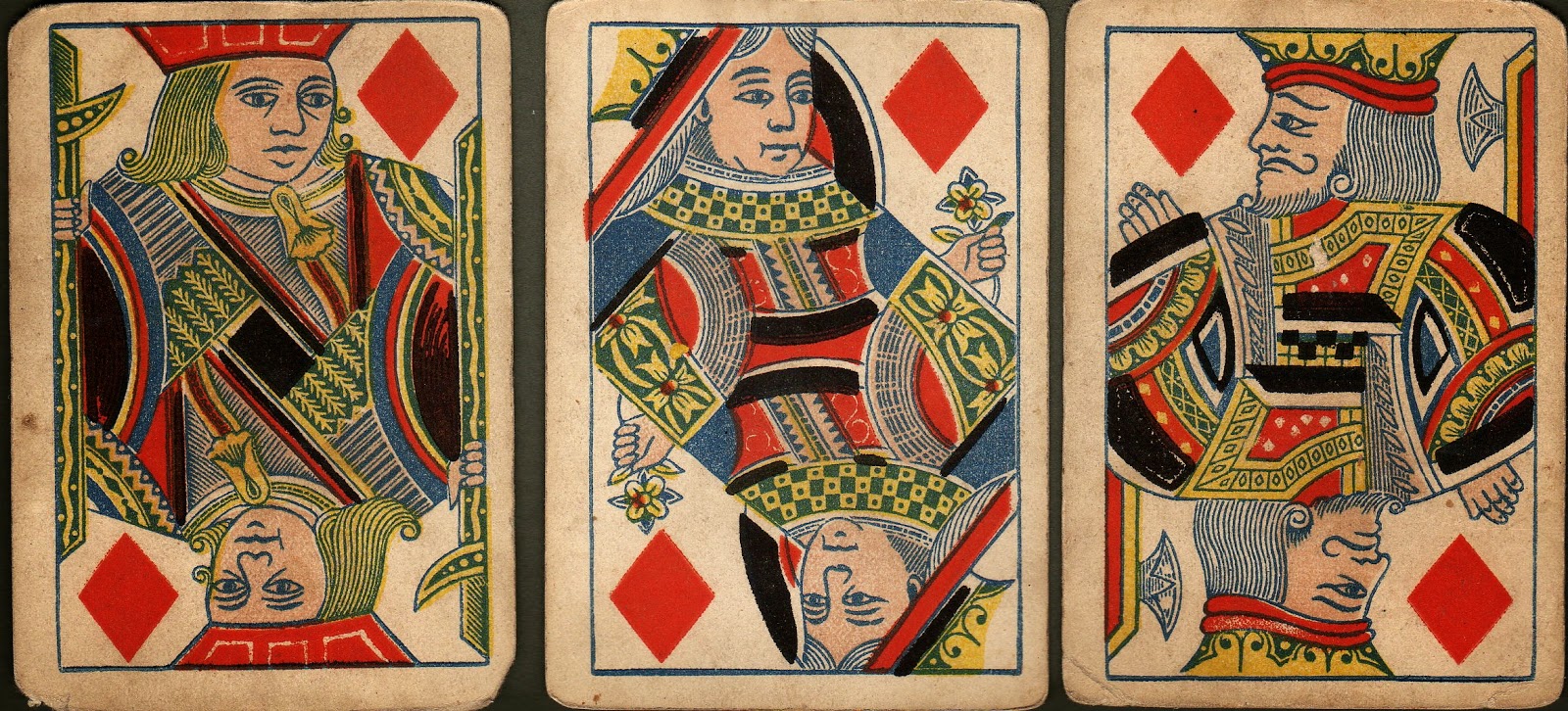
Above: USD4, c.1860
The design was then redrawn in his own style: the faces then took on an appearance of the old wood-block style, which was a distinctive characteristic of Dougherty's cards at this time. They were used in all grades of card.

Above: c.1872
These courts were also used in the triplicate packs a few years later.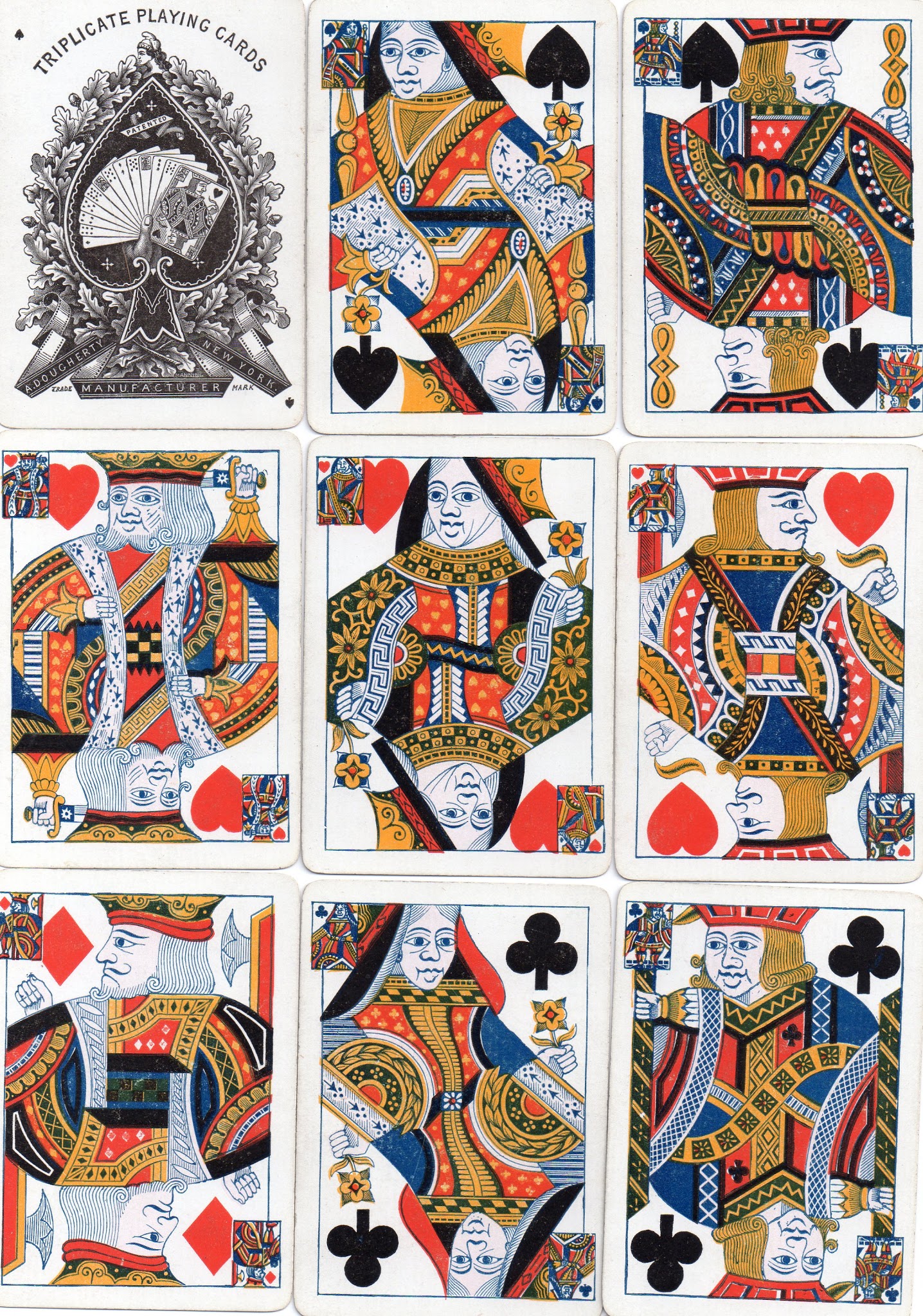
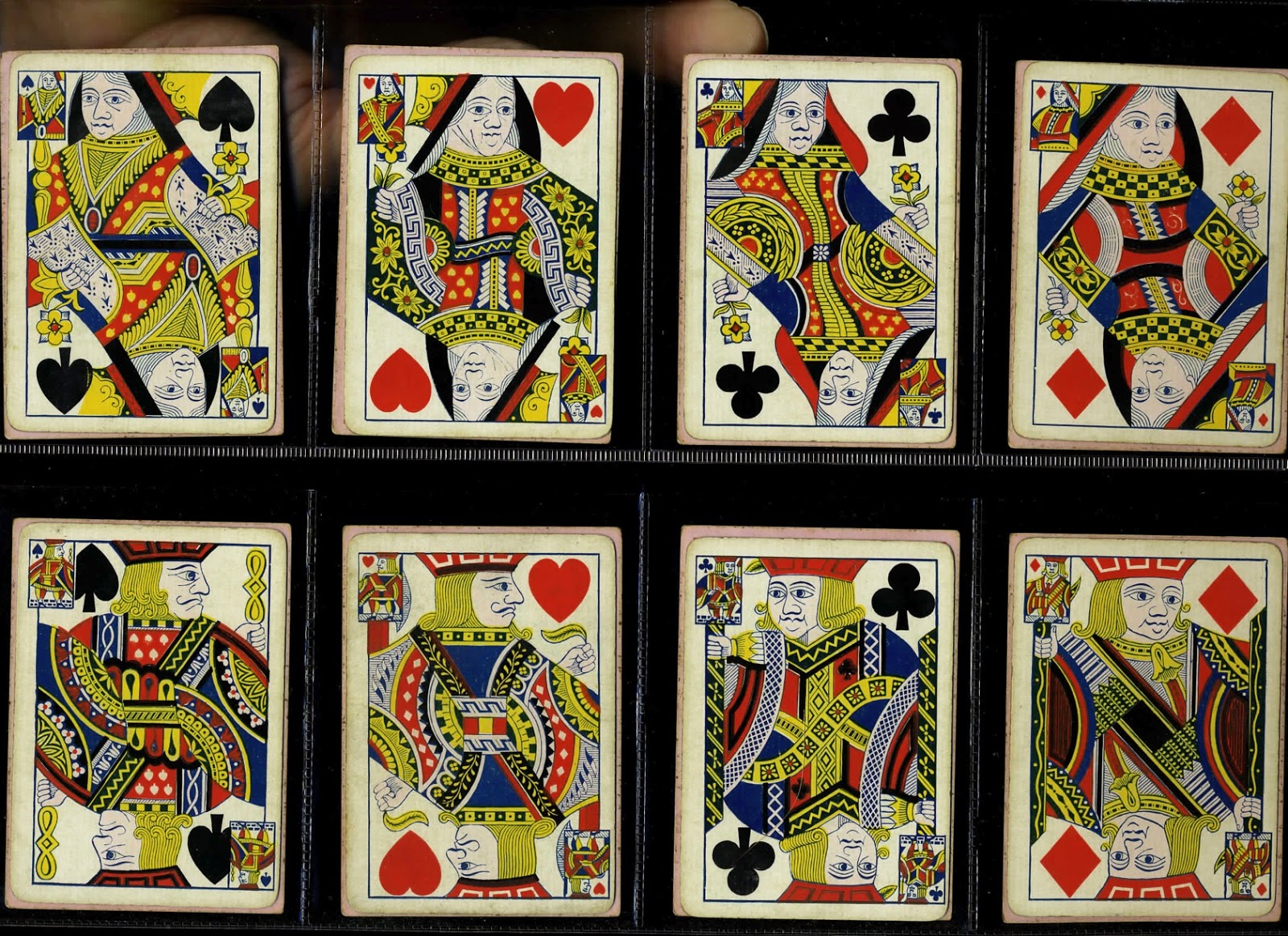
Triplicates, 1876-80
There are (at least) two versions: the lower one has larger indices than the other and has a turned QH. This turning moves the pip to the right to avoid the index, but it is not consistent in the pack, as the kings and JS have their pips cut into. The final version with letters as well as picture indices was produced in 1883 and the courts have been altered with all their pips on the right to accommodate the indices.
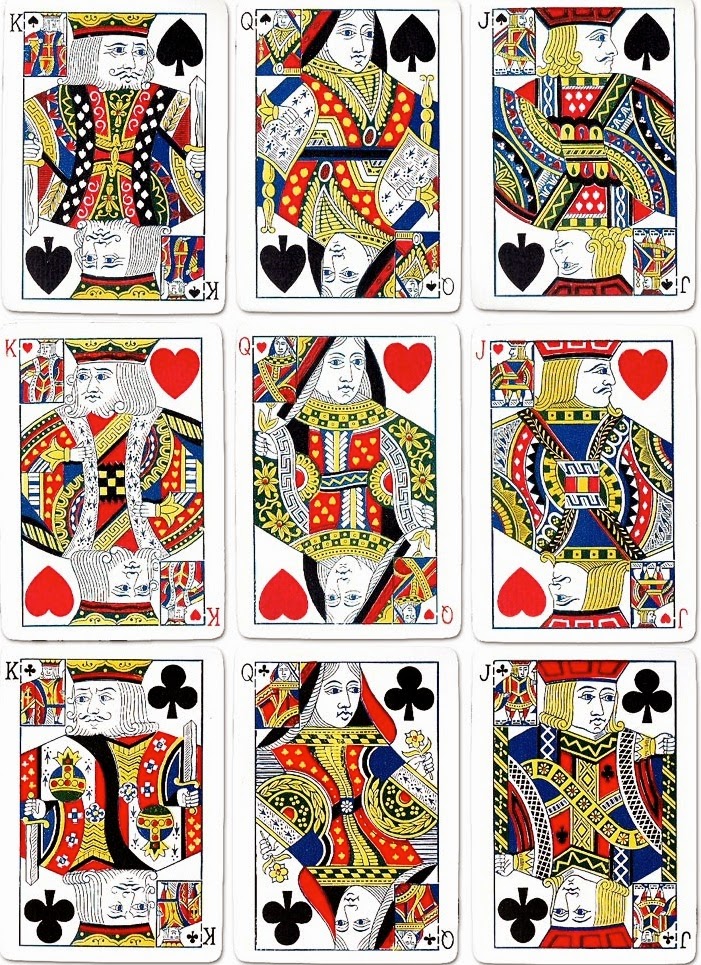
Above: Triplicate + Indicator indices, 1883
By this time the courts had had their somewhat strange wood-block faces tidied up to look more like other contemporary cards.
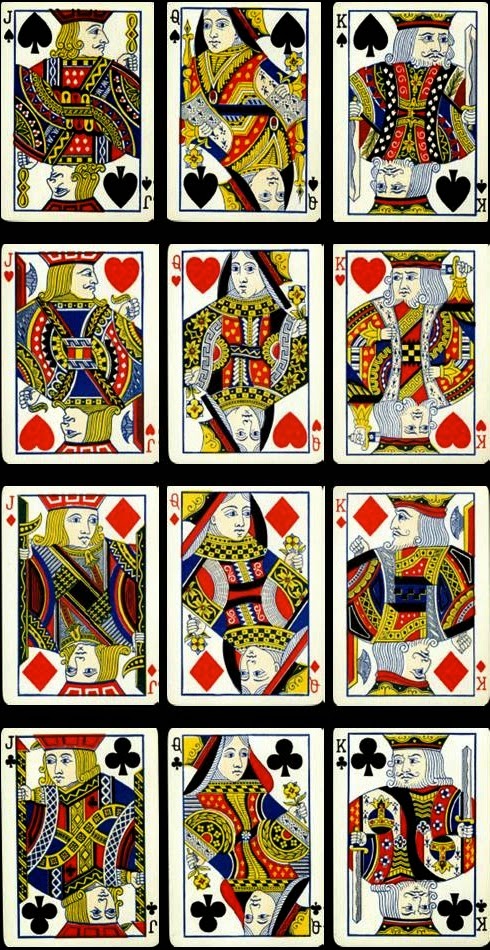
Above: Indicators, c.1890
A link between his wide-size courts and his later bridge cards is furnished by the Polo brand, which was made smaller than even modern bridge cards in order to facilitate holding thirteen cards. I don't know whether these courts were also used in the similar sized Jewel brand packs.
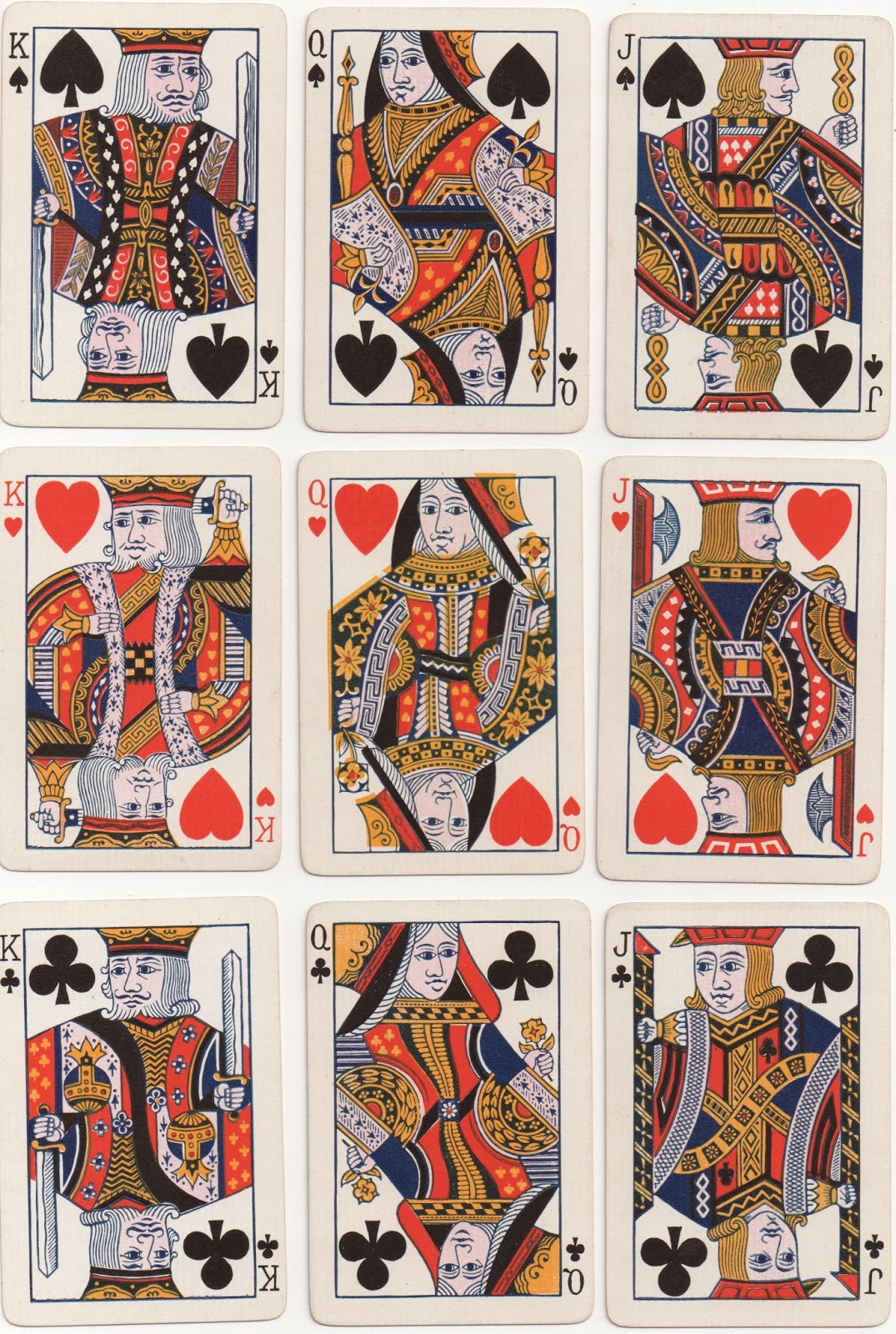
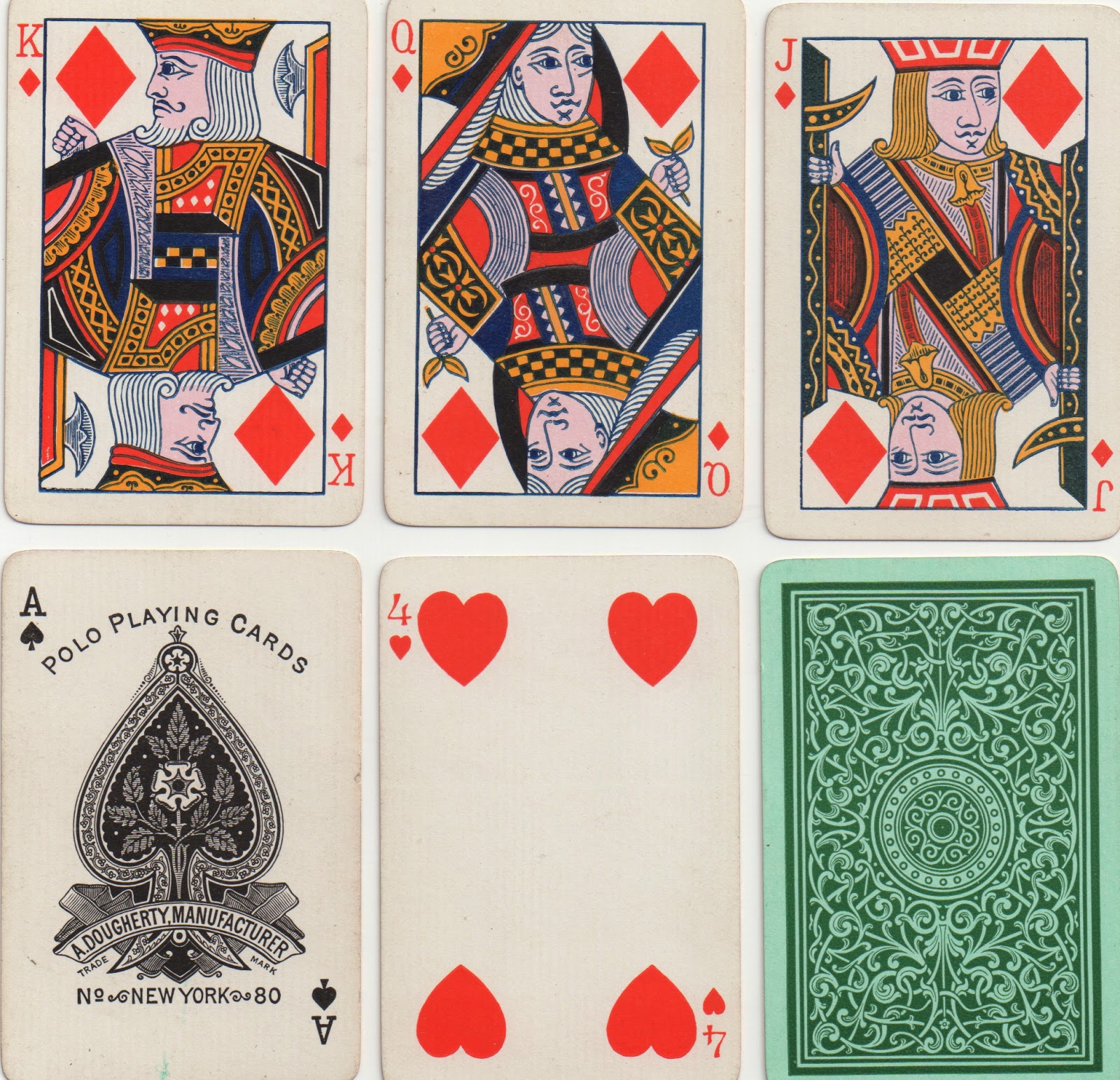
Above: Polo whist/bridge cards, c.1900
After the turn of the century the indices became bigger with consequent redrawing of the courts. Normal sized bridge cards were also introduced, which involved yet another complete redrawing.
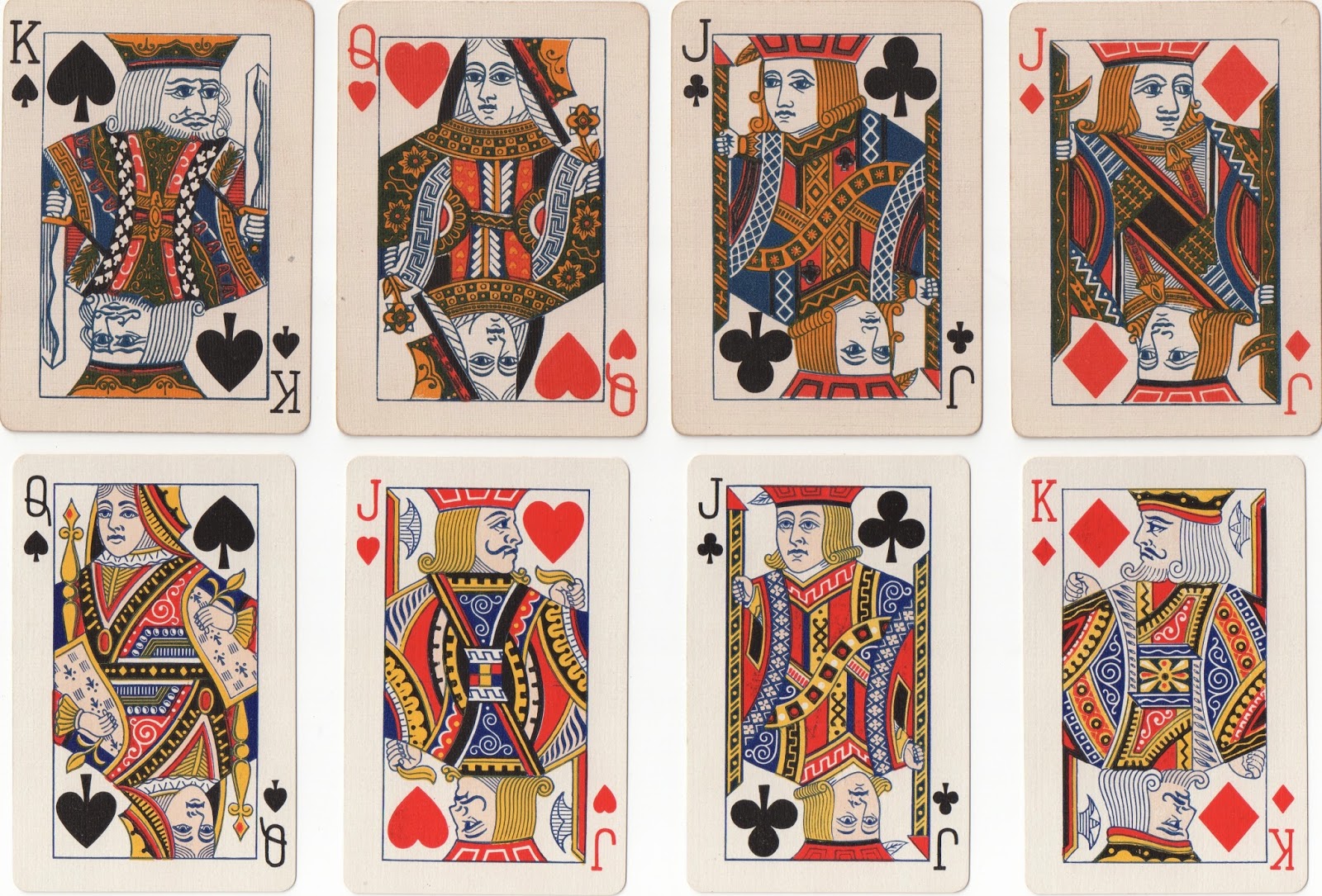
Above: Top: Tally-Ho, c.1910. Bottom: bridge size, c.1925
These courts were not used much after the formation of the Consolidated-Dougherty division of USPCC in 1930, though there are examples from as late as the early 1950s.
By Ken Lodge
United Kingdom • Member since May 14, 2012 • Contact
I'm Ken Lodge and have been collecting playing cards since I was about eighteen months old (1945). I am also a trained academic, so I can observe and analyze reasonably well. I've applied these analytical techniques over a long period of time to the study of playing cards and have managed to assemble a large amount of information about them, especially those of the standard English pattern. About Ken Lodge →

Leave a Reply
Your Name
Just nowRelated Articles
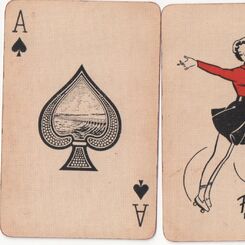
55: China 2
Some further American designs used in China.
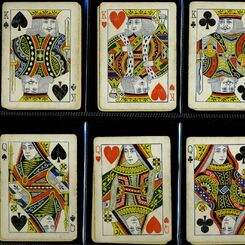
35: More Design Copies
Here I want to take another widely copied design and see how individual variation by the copier can ...

Grimm's Forest Playing Cards
A non-standard pack created to play an original board game; inspired by the Brothers Grimm fairy tal...
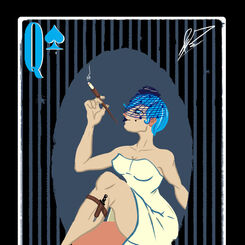
Gangster playing cards
A small set of gangster and mafia inspired cards created by Jacob Reynolds.
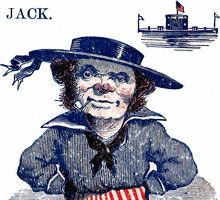
Army & Navy
Andrew Dougherty’s Army & Navy deck from the Civil War era, c.1865.
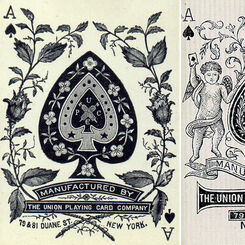
Union Playing Card Co.
Not much is known about this early manufacturer who is reckoned to have traded between c.1860s-1890s...
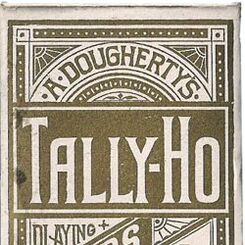
Tally-Ho
The earliest Ace of Spades had the Centre Street address and the Jolly Joker was used until the “Tal...

Indicator No.50
No.50 appears at the bottom of the Ace of Spades and the cards have corner indices and miniature sui...
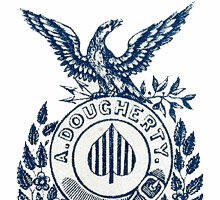
Andrew Dougherty c.1850
The idiosyncratic courts used in this deck were used by several other U.S. manufacturers, including ...
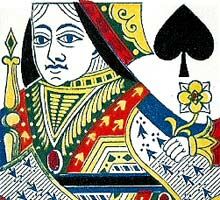
Cruiser Playing Cards
Dougherty's ‘Cruiser No.96’, first published c.1897, was dedicated to the U.S. Navy..

13: Some North American Cards
I deal with some of the US makers in more detail on other pages, but here is a brief introduction.
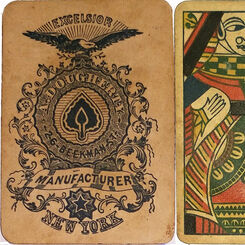
Excelsior
Excelsior by A. Dougherty, c.1870.
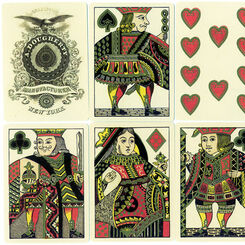
Illuminated Playing Cards, c.1865
Facsimile edition of Andrew Dougherty's Illuminated deck, c.1865, published by U.S. Games Systems, I...

Andrew Dougherty 1848-1930
Andrew Dougherty was born in Donegal in Northern Ireland in 1827. He started his playing card busine...
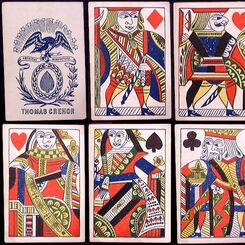
Thomas Crehore copy, c.1850
Thomas Crehore copy, c.1850.
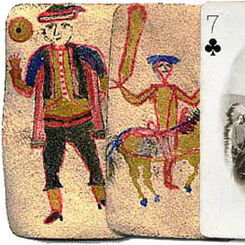
U. S. A.
The manufacture of playing cards in America only began during the second half of the 18th century, a...
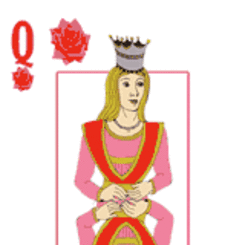
Bonnie Blue’s Rummy Cards
Bonnie Blue’s Rummy Cards.
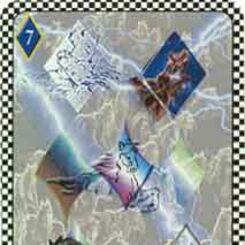
4 Seasons Playing Cards
Colours of the Four Seasons - Playing Card Art Deck
Most Popular
Our top articles from the past 60 days


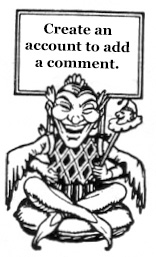 Your comment here. Your comment here. Your comment here. Your comment here. Your comment here. Your comment here. Your comment here. Your comment here. Your comment here. Your comment here. Your comment here. Your comment here. Your comment here. Your comment here. Your comment here. Your comment here. Your comment here. Your comment here. Your comment here. Your comment here. Your comment here. Your comment here. Your comment here. Your comment here. Your comment here. Your comment here. Your comment here. Your comment here. Your comment here. Your comment here. Your comment here. Your comment here.
Your comment here. Your comment here. Your comment here. Your comment here. Your comment here. Your comment here. Your comment here. Your comment here. Your comment here. Your comment here. Your comment here. Your comment here. Your comment here. Your comment here. Your comment here. Your comment here. Your comment here. Your comment here. Your comment here. Your comment here. Your comment here. Your comment here. Your comment here. Your comment here. Your comment here. Your comment here. Your comment here. Your comment here. Your comment here. Your comment here. Your comment here. Your comment here.

